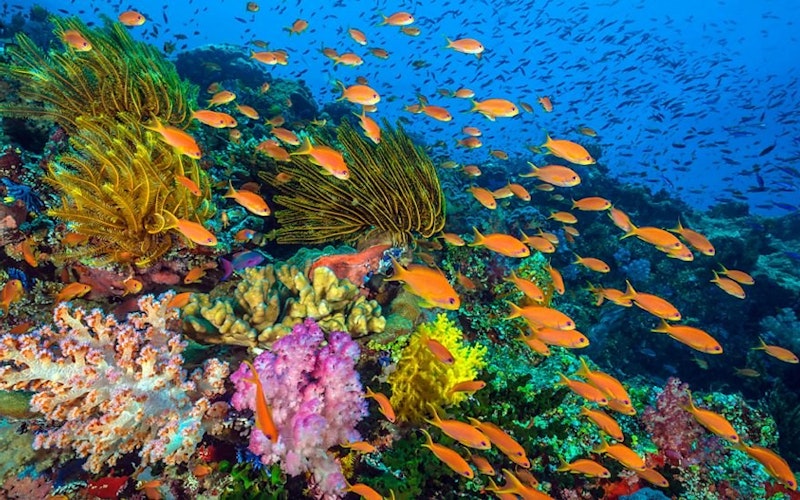
TV
Authority and Vulnerability in Blue Planet II
In a talk called What Rules Your Heart?, author, speaker and musician Andy Crouch unpacks the creation poem from Genesis 1. The poem follows a rhythmic pattern day after day. “And God said, ‘Let there be…’ and it was…and it was good…and there was evening and there was morning.”
But on the sixth day, the poetic rhythm breaks. God starts saying unprecedented things, indicating something exceptional is afoot. Indeed, God moves from making the earth, to making human beings in his own image. Being image-bearers grants humanity authority and vulnerability that set us apart from the creatures around us. Crouch tells us how those traits make us stand out:
“I want to define authority as capacity for meaningful action. Human beings have more capacity for meaningful action than any other creature. Other creatures do act in the world and they even order the world in certain ways. They build nests. They build environments where they can live. But human beings can order and shape the world far more than any other creature can…At the same time the other thing we have more than any other creature is vulnerability. More than any other creature God made, we human beings are vulnerable. Think of vulnerability as exposure to meaningful risk…this is true for human beings far more than anyone else in many, many dimensions.”
To understand the consequences of our authority and vulnerability run amok, we must start with a sense of the glory of our only world. Ever since I was a kid, I’ve loved nature documentaries. When I first encountered Blue Planet, the David Attenborough-narrated BBC masterpiece, I was captivated. Now, 17 years later, we have Blue Planet II, a fascinating sequel balancing delight in the wonder of creation, and lamenting the role humans have played in its destruction.
Each episode of Blue Planet II reveals a window into a world usually hidden from view below the water. Racing pods of dolphins joining schools of tuna and pods of whales to feast in the vast open ocean. Teams of sea lions hunting fish in the rocky lagoons of the Galapagos. The first glimpse ever at the teeming life on the Antarctic sea floor. The entire series resounds with the wonder and intricacy of God’s creation.
But an undertow of lament tugs at this beauty. Life in and around the oceans is suffering. While the joy on display far outweighs the poignancy, Blue Planet II brings the hardships facing our seas to the fore. This mixture of delight and sorrow brings to mind the words of the apostle Paul in Romans 8:20-22:
"For the creation was subjected to frustration, not by its own choice, but by the will of the one who subjected it, in hope that the creation itself will be liberated from its bondage to decay and brought into the freedom and glory of the children of God.
We know that the whole creation has been groaning as in the pains of childbirth right up to the present time."
It’s overwhelming to feel implicated in a problem that feels so entangled with daily life. But at the same time, scripture asks that we sit with this for a while.
Blue Planet II puts some of that groaning on display. There’s the expected talk of warming oceans, bleaching coral and disrupted spawning patterns. However, what struck me most was the havoc caused by plastic in the ecosystem. The sheer quantity of garbage in the oceans staggers the mind and breaks the heart. In addition to entangling and choking sea creatures of all shapes and sizes, plastic shows up in their blood because it slowly leeches into the seawater as it floats along. Surely we, too, should groan in sorrow.
It’s overwhelming to feel implicated in a problem that feels so entangled with daily life. But at the same time, scripture asks that we sit with this for a while. Plastic is a perfect case study for our failure to steward our authority and vulnerability.
The key features of plastic are its lightweight quality for its size and its almost infinite malleability. Discovering how to order molecules in such ways was an immense act of human authority, allowing us to flourish and creating a revolution in the sanitary storage and transportation of food and water. But in Blue Planet II, we see the consequences of an ocean full of junk. You have to wonder if maybe we over-used our authority at the expense of our world. In response to our vulnerability, perhaps we hurried to flourish by having food and water more readily at hand, without considering how to steward this new discovery well. Now, our very good world bears the burden.
What keeps Blue Planet II from insufferability is that its ultimate plea isn’t for impossibly total, immediate societal change. Instead, it asks us to just hang on a second, to slow down, consider how we live in the world, and how we care for it. This is the essence the Christian idea of stewardship, reaching back to the garden where God charged humanity with the care of his creation. Set us to take the work of its vulnerability (and our own) seriously, in order to make the best, most meaningful actions we could.
In the wake of the Fall, caring for God’s creation means continually circling back to rethinking (and perhaps even un-thinking) our use of authority in it, our use of ingenuity and power. We’re called to submit our vulnerability to God, not to our own strength. The genius of Blue Planet II is that it fills our eyes and our minds with wonder overflowing in the conviction that this is indeed a good world worth caring for.
Topics: TV